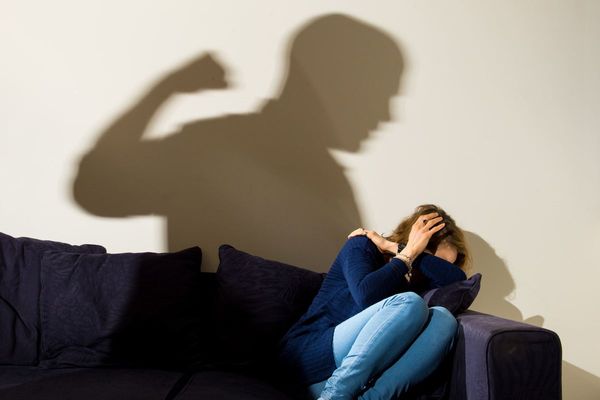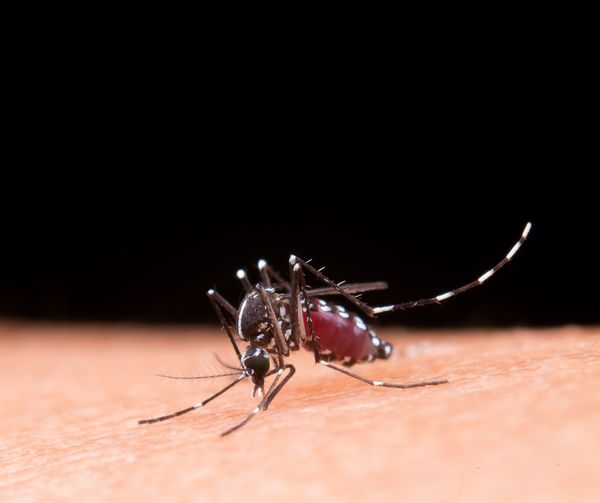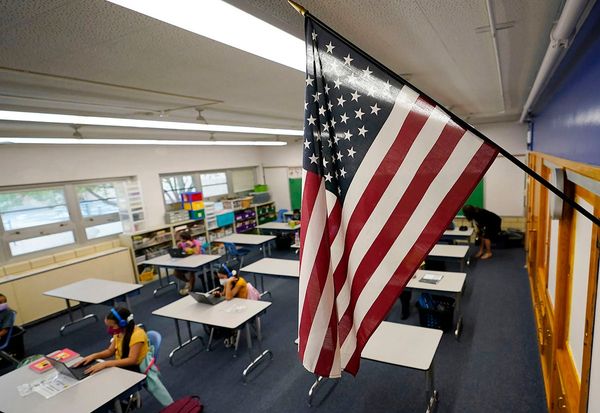
A year after Myanmar erupted into civil war prompted by a February 2021 military coup, more than half a million people have been internally displaced and millions are unable to access basic food and medical needs.
For women, the hardships are compounded by the challenge of managing their monthly periods.
“I have to use one sanitary pad for the whole day and night. I use it until the blood overflows and sometimes, I use a cloth when I don’t have pads at all,” said Sandar, from the country’s northwestern Sagaing region.
Over the past year, Sandar has had to flee her village on numerous occasions, sleeping under a sheet of tarpaulin in the forest or taking shelter in nearby schools and monasteries. The crisis has not only made it difficult for her to get sanitary pads, but also to find enough water for bathing or washing her underwear – leaving her physically uncomfortable, embarrassed, and at risk of infection.
“I don’t feel confident to walk around or go near other people when I am menstruating,” she said. Al Jazeera has used pseudonyms for Sandar and the other women in this article because of the risk of military reprisals for those who speak to journalists. “I feel insecure that people may notice an odour and I constantly ask other women to check my back for blood stains.”
At any one time, 800 million people around the world are having their period. Even in the best of circumstances, the experience can cause discomfort and stress for many women, but for those living in poverty or troubling situations such as conflict, menstruation can have much graver implications for their health, safety and wellbeing.
Maggie Schmitt, a public health researcher at Columbia University’s Gender, Adolescent Transitions and Environment (GATE) programme, which has been working with the International Rescue Committee since 2015 to conduct global research on menstruation in humanitarian emergencies, told Al Jazeera that displaced women and girls often not only face period poverty, or difficulty affording menstrual products, but often lack access to these products as well as safe, private and clean toilets and facilities for changing and washing.

Fear of bloodstains due to insufficient menstrual products may keep women and adolescent girls from participating in their daily activities including work and school, while the inability to bathe with soap and clean water or change menstrual products leaves them susceptible to infection, often with limited medical treatment options.
“There is a need for more attention to the menstrual needs of those in transit, including the girls and women moving from place to place in search of safety and refuge,” said Schmitt.
In Myanmar, widespread fighting and instability as well as the military’s attacks on residential areas and displacement camps have severely impacted women’s ability to meet their basic needs during menstruation. Women in Myanmar told Al Jazeera that being constantly on the move hindered their access to sanitary pads and clean water, and said they had little privacy.
They added that sanitary pads were increasingly beyond their budget. The price of basic goods has climbed across the country amid rising fuel costs, supply chain disruptions and the falling value of Myanmar’s currency, the kyat.
In conflict-affected areas, basic items are also in short supply because the fighting has shut down local markets and made it harder to deliver goods to shops. The military has also blocked the transit of essential supplies – part of a long-running strategy known as ‘four cuts’ which seeks to starve armed resistance groups of their support base.
Meanwhile, some 1.6 million people in Myanmar have lost their jobs in 2021 due to the pandemic and coup, and armed conflict has left many farmers and daily labourers unable to work. Last December, the United Nations forecast that by early this year, nearly half of Myanmar’s population would be living on less than a dollar a day — that’s twice as many people as five years ago.
‘I am afraid that men will see my blood’
Sandar, who is 27, fled her village in Sagaing Region’s Kani township for the first time last April. It was less than three months after the coup, and armed resistance was just starting to emerge in rural areas after the military shot hundreds of non-violent protesters dead.
The Sagaing region, in northwestern Myanmar, was one of the first areas where civilians fought back with weapons. As its armed resistance has grown, the military has retaliated by raiding and burning villages and committing mass killings – including in Kani township, where the bodies of at least 40 men were found in July, most with torture wounds.
To avoid encountering soldiers, villagers across the state frequently hide in forested areas, monasteries and schools, waiting for days or weeks before they risk returning home.
In Sandar’s village, there is now only one shop that sells sanitary pads, but it sometimes runs out. Even if pads are available, the cost has roughly doubled since the coup, and Sandar and her family have no income. She has been on strike from her teaching job for more than a year as part of a nationwide Civil Disobedience Movement, while her family have been unable to find work as day labourers due to the conflict.
“My family prioritises spending on food and necessities, so when we are at home, we normally don’t use pads. We just stay in our rooms, and our htameins [sarongs] are ruined” by menstrual blood, she said.
When Sandar has to flee to the forest, there is often no nearby water supply for bathing. Villagers have to search for a farm, which has a well and is safe from soldiers, but there is not enough water to go around, so Sandar only bathes about once every three days. “We prioritise drinking water over bathing,” she said.
The water situation is better at monasteries and schools, but conditions are crowded, and men and women share sleeping, bathing and toilet facilities.
“When I am menstruating during flight, I only bathe at night because I am afraid that men or other people will see my blood,” said Sandar. “We don’t have a private place for changing pads or clothes because there are many displaced people staying together in the same place. I normally change my pads at night when everyone is sleeping.”
Without a place to discreetly dispose of used sanitary pads, Sandar sometimes carries them around until she can return home. She also lacks a private place to dry her underwear, so she hangs them under other clothes and often wears them again while they are still damp. “I suffer from skin irritation and an uncomfortable feeling every month,” she said.
Women in southeastern Myanmar near the Thailand border describe similar problems.

The area has seen incessant fighting over the past year, displacing more than 230,000 people, many who are now desperate for water, firewood and food.
The crisis is particularly severe in Kayah State, where more than half of the population is now displaced and where the military has bombed the capital city as well as displacement camps and churches.
Htee Meh, who was a university student before the pandemic and coup, fled her village last May due to the fighting. She has since been moving from place to place, sleeping in other people’s houses or the forest, sometimes without any cover. Although she was often left drenched at night during the rainy season, it is now seven months into the dry season and she is struggling to find clean bathing water.
“Wells are drying up. When we are in the forest, we have to bathe in the same pond with buffaloes and cows, and we have skin irritation and rashes,” she said. “There are streams and creeks which are closer, but we don’t dare to go and bathe there because we could be more easily targeted by soldiers.”
She also described a lack of privacy. “Our temporary tents do not have doors or proper rooms,” she said. “When we need to change sanitary pads, we ask people like female family members or friends to watch outside.”
On top of this, she often runs out of sanitary protection. “Sometimes, there are no sanitary pads at all due to roads being blocked,” she said. “Right now, [people] cannot work due to constant fighting…Even if we want to go and buy [pads], it is very dangerous to travel around and petrol prices are very high too.”
Not wanting to waste a cloth, sometimes she goes without any menstrual product at all. “It makes my underwear very dirty and uncomfortable,” she said. “There is no water to wash my underwear or clothes, so when I am menstruating, I am not confident to walk around or talk to other displaced people.”
Crowdfunding sanitary needs
Several groups are working to distribute sanitary pads to displaced people, but the women interviewed by Al Jazeera said that few or no pads have reached them.
A volunteer, based in southeastern Myanmar, who has been crowdfunding donations to buy and distribute sanitary products, said that she and other volunteers face constant risks when travelling to reach displaced people, who are mostly sheltering in remote areas.

Procuring pads is also difficult, she said, because most local shops are closed due to the conflict. When she orders pads from Yangon, however, the delivery is often delayed. She added that women often hesitate to ask for pads out of embarrassment because most volunteers involved in aid distribution are men.
In the Sagaing region, Sandar raised a similar concern. “Men are the ones managing most displacement camps, and women are shy to bring up menstruation,” she said. “The camp managers or people in charge also normally forget to arrange for women’s needs like pads.”
Significant numbers of women have joined armed revolutionary groups, living in remote training camps and moving around in the jungle and forest. Gloria, 19, said that managing her periods has been hard since taking up arms against the military this February in Moebye, Shan State.
“Sometimes, we cannot even change our sanitary pads in a day. I have to use the same pad for as long as it can hold,” she said. “Sometimes, when I don’t have sanitary pads, I cannot do much and just stay in the shelter and sleep.”
She is one of about 10 women in a unit with more than 100 men, and although women camp separately and have their own latrines, they share a bathing area with the men. There is only one bar of soap and scarce water, so Gloria bathes about twice a month.
When she goes to the front line, she usually spends days in the same clothes and underwear. She burns or buries her used pads or carries them around in her bag, and with only drinking water available, she cannot bathe at all.
Still, she pushes forward.
“I have menstrual cramps. I also have to carry guns and heavy bags while trying to catch the other comrades’ walking pace,” she said. “I will keep going despite all these difficulties because I want democracy.”
This article was supported by a grant from ARTICLE 19 under Voices for Inclusion, a project funded by the Netherlands Ministry of Foreign Affairs.







